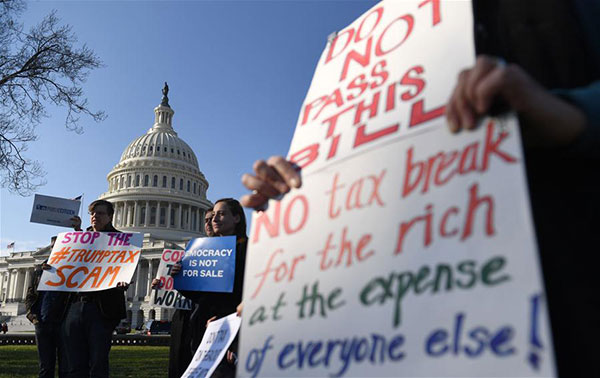US tax overhaul's lure could be deceptive


Chinese scholars said market expectations should remain objective on Washington's approval of a tax overhaul and they expect its benefits targeting special groups in the United States will be limited.
Despite the PR effect marking the US as an attractive business location, the nominal 15 percentage point reduction of the corporate tax rate may only mean a real decrease of 2 percentage points in tax payments, according to the US Congressional Budget Office, because the tax base has simultaneously been enlarged, said Liu Shangxi, head of Chinese Academy of Fiscal Sciences.
Investors will carefully calculate the real effects before making any decision to shift capital to the US just for tax avoidance, taking into consideration factors such as the market potential, infrastructure construction and other business favorable conditions, he said.
Scholars assume that the US tax cut will benefit business owners or investors first, after which the increased investment may raise workers' wages.
Tax cuts began in China years ago, especially since the value-added tax pilot program, which was launched in 2012. According to official data, tax revenue has been reduced by nearly 1.7 trillion yuan ($257 billion) so far, as a part of the country's ongoing economic rebalancing reform.
Meanwhile, taxes have been reduced on businesses in technology innovation and green development, as well as for small and medium-sized enterprises.
In the past five years, the central government's income from administrative fees has declined by 320 billion yuan per year on average, and provincial-level governments took in 47 billion yuan per year less, the data showed.
After tax reform was approved in the US Congress, at least two weeks would be needed for President Donald Trump to sign it into law, but delay is possible.
Intensive negotiations on the differences between the House and Senate bills will continue until mid-December.
Both the House and Senate bills have introduced base erosion rules-tax avoidance strategies that exploit gaps and mismatches in tax rules to artificially shift profits to low or no-tax locations-as identified by the Organization for Economic Cooperation and Development.
As a result, Chinese investors may see increased after-tax returns from the US investments, and Chinese multinational enterprises may suffer fierce competition from their US counterparts due to the reduction of the US corporate tax rate, said a research note from the KPMG professional services firm.
Chinese tax policymakers may consider taking measures to maintain China business competitiveness, it said.
Liu Yi, a professor at the School of Economics in Peking University, said: "A wave of tax reduction competition is likely to emerge among the world's major economies over the long term if the US president can finally sign the bill. Governments' expenditures on welfare could be reduced, and that may drag down the level living standards of social livelihood."

























